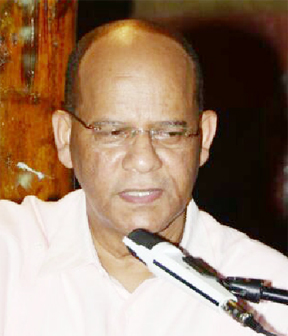Following a year in which allegations of torture, brutality and unlawful killings have piled up against police, the Force is likely to see the introduction of body cameras for officers; and while Home Affairs Minister Clement Rohee has deemed this a necessity, former police commissioner Winston Felix calls it “a waste of time”.
During the ministry’s year-end report on Friday, Minister Rohee promised improved performance in all of the ministry’s agencies through technological advancements. As regards the GPF, he said that body cameras will be a part of the force’s upgrade this year.
He stated, “The use of body-worn cameras has now become a necessity and will be introduced in 2015.” He continued, “We all know that…change can be difficult but once embraced, change can be enriching and invigorating.”

When contacted yesterday for more information on the ministry’s introduction of the technology, Rohee refused to offer anything further and maintained that whatever was said at last week’s press conference was all he had to say on the matter at this point in time.
Meanwhile Felix, who is also A Partnership for National Unity’s (APNU) Member of Parliament with responsibilities for Public Security and Human Safety, told Stabroek News that the planned introduction was “just a waste of time” and opined that the GPF should work more on its criminal investigations.
“What you really need to do is improve the criminal investigations of the force; the cameras just tell you a story,” he said. He went on, “What you want is public confidence in the police and this can only be acquired by the manner in which the investigations are conducted.”
Furthermore, Felix stated that if the cameras are to be introduced they should be given to officers on patrol or on beats.
Guyana is not the first country in the Caribbean to consider the introduction of body-worn cameras for its police force. In September 2014, Trinidad and Tobago indicated that some of its police officers were expected to be outfitted with body cameras. The decision was reportedly taken following recommendations which sought to address the rampant issue of police killings in the country. At the end of 2014, T&T reported that 46 persons had been killed by police officers.
Similarly last year, Jamaica’s National Security Minister Peter Bunting shared that select police units would start wearing body cameras in an effort to boost transparency.
During 2014, there had been a number of alleged police killings and misconduct in Guyana.
On April 30, 2014, 15-year-old Alex Griffith was shot in his mouth. Cadet Officer Franz Paul, who was subsequently charged with the shooting, was alleged to have played ‘Russian Roulette’ with the teen. At the time, Paul was said to have been personally investigating a robbery committed against his sister, which was outside of his jurisdiction.
Further, between May 25 and May 27, 2014 Constable Earwin Forrester and Inspector Dexter Thornton of the Sparendaam Police Station were accused of burning the hands of 19-year-old Junior Thorrington while the young man was in custody.
Thorrington alleged that the lawmen soaked his hands with methylated spirits before lighting them on fire and then kept him in the lock-ups for three days before taking him to the hospital.
On September 20, 2014, Adrian Bishop was shot by the police and later died following a confrontation with his girlfriend, who is also a policewoman. Bishop was picked up by police and while being transported to a police station, the police claimed, he attempted to relieve an armed officer of his shotgun and was shot to the neck in the ensuing struggle. He was later pronounced dead on arrival at the Georgetown Public Hospital.
However, persons who claimed to have witnessed the incident alleged that Bishop was shot by a policeman who was beating his head with a gun.
On November 27, 2014, Asif Khatoon, 38, died after he was allegedly beaten by ranks of the Leonora Police Station days earlier, while in custody. A post-mortem examination (PME) later revealed that he had died of multiple injuries.
Khatoon’s relatives had held several protests supported by social activists after his death. Finally, on December 1, 2014, Police Commissioner Seelall Persaud promised the man’s widow a full investigation into his death.





